- Home
- Sarah Pinborough
The Language of Dying Page 5
The Language of Dying Read online
Page 5
Davey sniffs and wipes the back of his hand across his nose before inhaling again. The scent of the roll-up tobacco is rich and comforting in the fresh air and I breathe it in.
‘There was this DJ bloke that we used to hang around with …’ I almost drift as I wonder how many sad stories start with those words: There was this man or woman or girl or boy and for a while all was well … but instead I focus hard on the glowing end of Davey’s cigarette and listen.
‘Simon hung there more than me. The bloke was older than us. Probably about thirty, I guess. Sometimes Simon would stay there, you know, overnight. That bloke was a bit of a hero to Simon, I think.’ The smoke hangs almost unmoving between us. ‘One time he stayed there and then after that we didn’t go back again. Not once. Simon wouldn’t talk about it either. Not even to me. I think the drugs started after that.’
He offers me half the cigarette, but I shake my head. Smelling it is enough for me. The chains clink and squeal softly as Davey stretches backward in the seat. ‘I sometimes wonder why anyone ever talks at all,’ he says. ‘They never fucking say anything useful.’ He grins over at me and I smile back. Sometimes Davey surprises me too. He stands up, a black outline ahead of me, his big hands resting on his hips.
‘Paul should be here soon. That’ll be odd, all of us back in the old house again.’ He wanders inside and I say I’ll follow in a minute. I look up at your window, bright in the darkness, and I can see myself on the other side of it. Here and there at once. Time folding again.
6
I see it for the second time just after I buy the house from you. I am twenty-five. I am broken. You have trekked off to Nepal declaring no need for physical possessions, just as you declare that you no longer have a need for alcohol. Nepal is a long way to go to get away from hard liquor, but you are determined to leave it behind and get addicted to Zen. You say it’s less harmful for your liver than vodka. I manage a smile as we agree a figure and say our goodbyes. You don’t ask why I would want to buy the house. You are too busy fighting your own demons to see mine and I can forgive you that. I am not good at sharing the deep things. I guess that’s why I’ve left it all until now.
The sale goes through quickly and I put the money in a building society for you and distribute the rest out to each child-satellite for an early inheritance as you requested. It doesn’t take long for it to be gone and wasted. At least I have the bricks and mortar to show for it.
When you drift – especially like I did – you need an anchor. You need something that you belong with and that belongs to you, and I have nothing else. Everything that was solid is gone. Even you have left me for the goats, mountains, prayers and dysentery of a mystic land.
I don’t know it then – I’m too dark in the drift – but we are all deconstructing. The boys are in London and you think they’re just being young and wild and angry at you for the whole Shetland experience, but they are in fact starting the degeneration that will have fully set in by the time you come back. It won’t be long before their landlady kicks them out, starting a lifetime habit, and as with all the landlords that follow, no one will blame her. Not even Davey and Simon themselves.
Penny is living what I choose to imagine is a fabulous and glamorous existence on some Costa or other. It later turns out that she has her share of problems, but, as I stand in the small room, I can’t see that her life would be anything other than perfect. And Paul? I never really know what’s going on with Paul. As I stand in the back room peering out of the window I don’t even know where he is. He either answers his phone or he doesn’t. And I’m not much in the mood for talking. The words have all dried up at the back of my throat. On a subconscious level I have come home to fade because I can’t see where else this bleakness can lead. And I want to be left alone while I do it. There has been too much talk. Even my own words barely make sense.
I know that I could go to Penny and she would welcome me with open, glowing arms, but I wouldn’t fit there. I don’t think I fit anywhere but here. Here is safe. Here I don’t have to face my broken marriage and my broken heart or what’s left of my broken mind that the pills are fighting so valiantly to repair. Here I can breathe and let the cracks show. And maybe bleed through them a little.
I peer out through the curtain and the sun is shining brightly, glinting on the chains of the swings. I can feel it on my skin through the glass. It feels good because the house has that coldness buildings get when they have been empty for too long. The heating will be on for days before it manages to breathe any life back into the walls. I can hear the boiler raging. I think it will take more energy than it can produce to warm me. I can barely feel my insides most days. I stare out through the glass for a little longer before turning to face the remnants of the room that Penny and I used to share.
It’s the same, but not. I can see that you have been distracted by the changes in your life. Like you, the dimensions of the room have stayed the same, but the contents have changed a little. It’s odd, a bit like adjusting to the new you. You are sober, but still compulsive as you seek answers for the failed marriages and the years lost in an alcoholic haze. Eventually you’ll leave the questions behind, but not yet. I trace my finger on a windowsill that feels almost damp.
Parts of the room are gone. The small beds we occupied have been dismantled long ago and you have replaced them with a desk and a small lamp. The room is obviously intended to be a study of sorts. There are boxes of paper everywhere, notes in your sharp scribble covering sheets and sheets of it. Beside the desk, the waste-paper basket is full of crumpled, abandoned balled-up paper. I think about reading some of the words, but my brain doesn’t have room for them – all the hurt and empty space fills it. Instead I just stare at it all for a minute or two before turning away.
Our old bookshelf still stands in the corner; badly drawn flowers covering the sides in felt tip, their brightness faded with too many years passed. I can still remember drawing them, sharp and clear. Mine are small tight squiggles on stalks and Penny’s have big green leaves and huge petals. Make from that what you will. It’s not rocket science.
Dusty children’s books still sit in a raggedy heap on the shelves. I wonder why you haven’t boxed them up or given them to a charity. Maybe you were planning to, but all the writing on those screwed up pieces of paper got in the way. You are like Paul in that way. Obsessive about things.
I pick up a large white hardback. Some of the shiny spine has been ripped away exposing the thin cream-coloured mulchy cardboard underneath. I look at the front and the bright picture rings bells in my head. This was a loved book. Maybe that’s why you haven’t packed them away yet. Maybe these books keep us with you even when we’re far away. Talismans. Unlike our mother, you love us better as children than as babies.
I rub the thick seventies paper between my fingers, memories of smell and taste and sound filling my head - here and just out of reach – and I flick to the first story. It’s a fairy tale of course: a princess and her equally beautiful partner dance across a glittering ballroom beneath an ornate title, leaving no question about the ending. I don’t remember it ever spoiling my enjoyment of the stories. I still believed in happy endings back then. Even after Mum left, a little sparkle still lived inside me. Children recover well from things like that, don’t they? The picture sends a hum through me and the book feels familiar. On the next page the story starts to tell itself and I wonder how many years have passed since it’s had that chance. The letters are large and black and tug at my insides. Once upon a time there was a beautiful princess in a faraway land.
My hand trembles. I feel as if my skin is shaking itself free from my flesh and then the pages blur. I used to love these stories. I hug the book tight and lean against the window, huge sobs escaping from my hollow chest. I slide to the floor, the windowsill banging hard into my spine. I don’t care. The pain is outside of me. I am empty. I am nothing. I can’t hold it together anymore, pills or no pills. There is too much darkness at the edge of my visi
on and I’m tired of fighting it. The drift has me. The drift has always had me. I was just too stupid to know. My eyes glaze and the book slips from my hand.
There was this girl, you see.
And there was this man.
And for a while, all was well.
*
I go to London when I’m twenty. Everyone has left home and I feel like the world is passing me by and taking opportunities with it. That’s what Penny tells me anyway, carrying me along with her excitement and glow and the rush of her words in the phone. She loves London. I’ll love it too. She has no doubt about this and before I can breathe properly I’ve packed my suitcase and I’m on the train, eyes wide and twitchy like a rabbit, a bundle of nerves and excitement.
Penny has a little flat in East Ham and she’s right. I do love it. We laugh a lot in those first two months, spending our evenings drinking cheap wine and smoking Benson & Hedges. I’m temping in an office, answering phones and typing letters; she is selling expensive make-up in Selfridges. She is very good at it, selling things. Customers like to buy from people with the glow, as if they think that personal shine will come with the product. It doesn’t, of course. If it did I’d be first in the queue. But I’ve been around Penny long enough to know that the glow just clings to the individual. You can’t share it.
We are young and Penny has a lot of boyfriends. Men like Penny, they always have. I don’t know how she keeps track of her admirers though, because the phone that sits on the table in the small hallway isn’t plugged in. Penny polishes the ivory and gilt pretty much every day, making sure it shines and shows off its worth, but it remains silent. We could plug it in, but there would be no point, we can’t afford the line rental. Penny has no intention of getting us connected and never has.
I ask her why she bought the phone in the first place if she wasn’t going to be able to use it and she looks at me like I’m mad. ‘People will think we’re poor if we don’t have a phone,’ is her explanation. It makes me laugh, but she is serious. She knows the importance of appearance, does Penny.
Sometimes we see Paul. He’s living just outside London and occasionally turns up with a bottle of wine and stories of his endeavours that make me laugh until I cry, Penny squealing beside me. If I hear stories like Paul’s from other people I take them with a pinch of salt. With Paul, though, I know that, however unlikely they may be, they are true. Paul is in many ways larger than life. He dominates conversations and social events, finding childlike fun in everything. This doesn’t always go down well with others, especially when his dominating becomes domineering.
Mostly though, when in public, he entertains. He makes people smile and that makes him happy and the audience either falls in love with him or at least begrudgingly admires him. When things are working for him, Paul is around. But then he disappears for months at a time and I know that, under the funny, Paul doesn’t find life all that easy. He’s stuck between me and Penny: too much hard and too much easy fighting inside him. Maybe that’s why, like you, he drinks too much and smokes too much. Maybe that’s his way out of the drift. He drives fast cars and earns silly sums of money, but nothing is stable around him. He spends more than he earns with a desperation that I think most people can’t see. I can, though. Even at barely twenty I can see. Still, you can’t tell Paul. No one can. And despite it all I love him and begrudgingly admire him.
I have boyfriends too. I don’t glow like Penny, but I am tall and slim and my sandy hair falls to my shoulders and when we go out together we look good – different enough, but both shining with youth. We often double-date, but there is nothing serious going on under the warmth of the wine and the man’s touch. Not for either of us.
Until that moment when, out of the blue, it happens. I meet him.
The One.
Whatever.
I often wonder how things would’ve been if we’d gone to a different bar or just gone home, but playing ‘what if’ games with the events of your life is a road to madness and I don’t need any more of those. My head is a network of those paths that I can see when I shut my eyes. What is, is. What was, was.
He doesn’t speak to Penny as we push our way to the bar, my sister already peering around for some willing male volunteer to buy the drinks we can’t afford to buy for ourselves. He smiles straight at me. His teeth are white. I notice that. His smile is wide and his eyes twinkle under his dark hair. I smile back, the bar, the drink and even Penny forgotten.
‘Hi,’ he says.
‘Hi,’ I say, right back. I fall in love in a snap. I can almost hear it inside. Within two months we are living in his large house in Notting Hill. I have a golden ring on my finger which proves his promise of unending love. I am the fairy-tale princess and have my fairy-tale ending. And all in that snap.
A year or so later, the snaps I hear are different. More varied. Subtle variations on a theme. I can hear the sharp snap in the air when his mood changes suddenly. I can feel the tension that grips my shoulders and my gut. What now? the pang asks. What did I say wrong? Did I put the cans in the cupboard unevenly? Is the TV remote control slightly out of place on the table? Or is it just one of those days?
Onomatopoeia is the key to my existence during my married years. Snap. Crack. Slap. Bang: sounds that belong in comic books rather than in my world. There’s no Superman to come and save me, though. My battle is quieter and more pathetic than that. The kind you just have to get on with on your own.
Some of the sounds I like. The click of the front door as it shuts behind him when he goes to work. The gasp of held air I can release when the house is my own. I don’t relax though. Never – not entirely. Since I no longer work, he schedules my day for me. There is cleaning and shopping and cooking and ironing. Sometimes I get things done quickly and try to watch a film or read a magazine on the sofa, but it makes my stomach knot too much to enjoy. He rings every hour to make sure everything is as it should be and sometimes he comes home early to surprise me.
I don’t think he’d like to find me with my feet up, reading something pithy about hair and make-up and the lives of celebrities. In fact, I know he wouldn’t like it. Reading isn’t something he likes me to do. He can’t share in reading. It can only be in my head and try as he might he can’t get all the way in there. That’s part of what will make me take the job in the library, years later. A way-too-late kick in the balls to someone long ago left behind.
I don’t know exactly when he starts to show himself through his cracks. Not long after we are married, maybe two or three months. I am sitting on one of the huge leather sofas that fill our expensive lounge, hanging up the phone after a long girly chat with Penny and then I jump out of my seat with the smack as the remote control hits the wall beside me. I stare at him, confused. I can’t believe that he threw it. Not at me, not then, but that he threw it at all.
‘I was watching the film,’ he says. ‘I couldn’t hear it over your pointless drivel and now I don’t have a clue what is happening.’ He is calm but his words are sharp and cold and I stare at him, my heart pounding hard, my face hot.
‘Sorry,’ I mumble.
‘Only call your sister once a week from now on.’ He turns his head back to the TV. We sit in silence and with a cold dread I feel the paper walls of my castle crumple and sag.
Most things in life change gradually. Events creep up on you from behind just like the language. You barely notice the beginnings; it’s only when things go terribly wrong that we wipe the sleep from our eyes and wail miserably, ‘How the hell did that happen?’ Still, that’s the way for all of us. Even you with your Zen and your calm intelligence. You brush off and put aside the first symptoms of the cancer that is killing you. It’s just a touch of indigestion, that’s what you think. Nothing to worry about.
I am like that with the malignancy in my marriage. The first few symptoms of my fairy-tale prince’s very flawed character are easy to brush aside. After a few cautious, watchful days of everything going back to normal, I put the remote-con
trol incident into a box in my head where I don’t have to think about it. He must have just had a bad day at work. This is what I tell myself when I lie awake in the warmth of our bed, listening to the gentle sounds of his breath as he sleeps. Neither of us mentions it. I don’t mention it to Penny either and I tell myself that’s because it’s not worth mentioning, despite the faint echo of alarm bells ringing in my subconscious. I don’t want to tell Penny, that’s the truth of it. I think she will be disappointed in me, or worse, maybe she will be expecting it, because it is all too good to be true.
Three months later I can no longer ignore the symptoms.
He comes to pick me up from the office and I come out laughing with a male colleague. I don’t know why we’re laughing, probably just a small, polite joke shared in a lift by two people who barely know each other. My smile falls when I get into the car and see his face. The tyres screech.
He doesn’t speak for two days other than to call the agency and tell them I won’t be coming back to work. I cry a lot. I ask him what I’ve done. He pins me down on the bed, straddling me, his knees on my arms. Leaning forward he spits in my face, his hands on my face, fingers pressing into my eyes. His words assault me until his rage passes and then he cries himself. I shake inside as he retreats into a ball in the corner. I feel sorry for him. I feel sorry for me. He seems so vulnerable and I sit on the carpet too and wrap my bruised arms around him.
‘Hush,’ I say. ‘It’ll be all right. We’ll be all right. I don’t care about work. I won’t go anymore. I just care about you. About us.’
I think I can mend him. This is my mistake because he’s not broken, he’s just been put together wrong. The only breakable thing in the relationship is me.
I live in a drift, not a deep one, but a dark one, and I save whatever shine I can muster for when Penny and Paul come and visit, which isn’t as often as they’d like, especially Penny, but more than enough for me to cope with. I live on a wire and the stress of visitors is enough to send me over the edge. They add an unknown quantity to my day. I can never judge what they might say or do, or what I may say or do in a brief relaxed moment that may need to be paid for later. I avoid drinking when we have visitors. I need to keep my wits about me. I’m good at pretending, though. I don’t think anyone notices. My brother and sister are far too busy being happy for me.

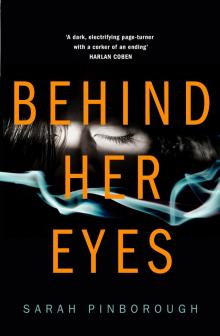 Behind Her Eyes
Behind Her Eyes The Chosen Seed: The Dog-Faced Gods Book Three
The Chosen Seed: The Dog-Faced Gods Book Three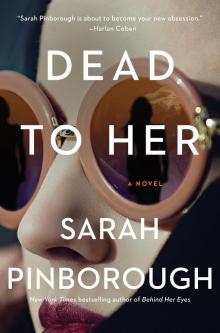 Dead to Her
Dead to Her Cross Her Heart: A Novel
Cross Her Heart: A Novel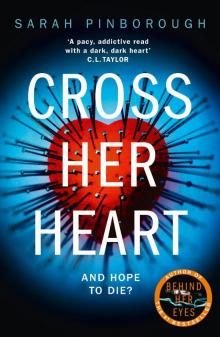 Cross Her Heart
Cross Her Heart Into The Silence
Into The Silence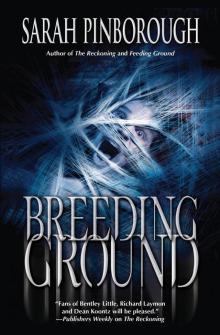 Breeding Ground
Breeding Ground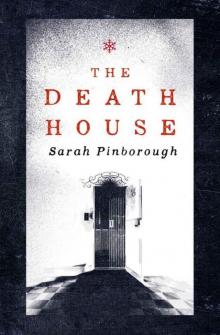 The Death House
The Death House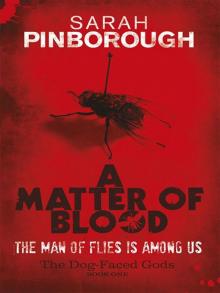 A Matter Of Blood (The Dog-Faced Gods Trilogy)
A Matter Of Blood (The Dog-Faced Gods Trilogy)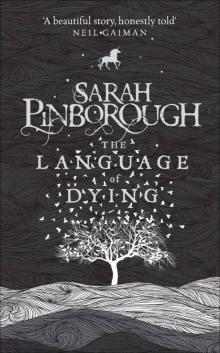 The Language of Dying
The Language of Dying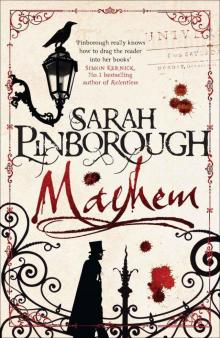 Mayhem
Mayhem Murder
Murder Torchwood_Long Time Dead
Torchwood_Long Time Dead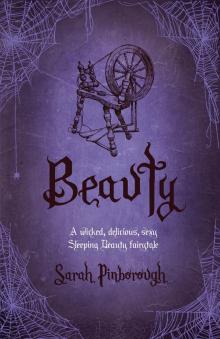 Beauty
Beauty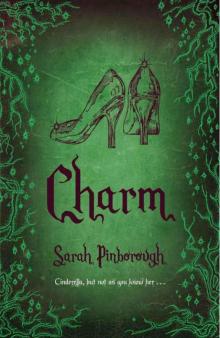 Charm
Charm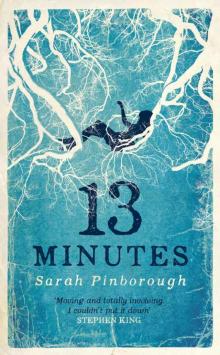 13 Minutes-9780575097407
13 Minutes-9780575097407 The Chosen Seed: The Dog-Faced Gods Book Three (DOG-FACED GODS TRILOGY)
The Chosen Seed: The Dog-Faced Gods Book Three (DOG-FACED GODS TRILOGY)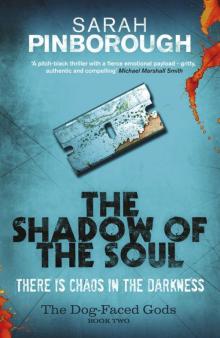 The Shadow of the Soul: The Dog-Faced Gods Book Two
The Shadow of the Soul: The Dog-Faced Gods Book Two Into the Silence t-10
Into the Silence t-10